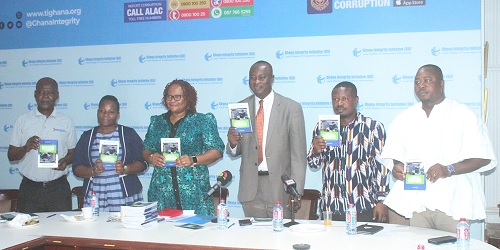The Office of the Registrar of Companies (ROC) has been advised to go beyond just receiving mere information from companies on their real owners, otherwise known as Beneficial Ownership (BO), to verifying the financial accounts of those businesses, the transactions in those accounts and the type of accounts they operate.
This will help inject more transparency into the business operations of companies and also to know who the real BOs are.
The Director of Anti-Corruption of the Commission on Human Rights and Administrative Justice (CHRAJ), Stephen Azantilow, noted that the whole idea of BO was to identify the people who were the real owners of companies.
He said often, people engaged in wrongdoing hide behind anonymous corporate structures, opaque financial systems and legal entities to engage in crimes such as fraud, money laundering and other illicit flow of money. He added that if the ROC conducted those investigations, such people would be exposed.
“We need to begin to interrogate to know what type of assets they have and how they came by those assets.
If we don't do these things, we will not get to know who the real BOs are because somebody can say, I'm a BO but he may be transacting the business on behalf of other persons.
Monies may be coming to him, but for all you know, it is somebody else who is benefiting from those resources,” he explained.
Mr Azantilow made the call at the launch of an assessment report of the beneficial ownership regime in Ghana conducted by the Ghana Integrity Initiative (GII).
The assessment formed part of a project funded by the Norwegian Agency for Development Cooperation (NORAD) through the Global Financial Integrity.
Company's Act
Ghana's Companies Act 2019 (992) mandates entities who seek to register companies or companies that are already in existence to provide information on the BOs of the companies they seek to register especially those who are politically exposed persons. This information is supposed to be recorded in the central register managed by the Registrar of Companies.
The objective of the BO is to promote good governance and accountability, minimise and eventually eradicate corruption-related assets such as money laundering, financial terrorism and transnational organised crimes and prevent the illicit flow of finances into Ghanaian companies.
The law provides for verification of the information provided on the beneficial ownership, however, according to Mr Azantilow, the registrar of companies, had not yet started it.
He pointed out that the verification was very important because it would help in identifying who the real owners of a company were and also see how they could checkmate crimes such as money laundering, terrorism and proliferation of weapons of mass destruction.
"Beneficial ownership transparency makes corruption easier to detect while making it a risky and unattractive venture," he added.
He warned those who were in the act of fronting for others with regard to the registration of owners of companies that under the company's Act, they could be sanctioned.
Rationale
Explaining the rationale for the assessment, the Executive Director of GII, Mary Awelana Addah, said it was, among others, aimed at assessing the legal regime, how enforcement had been done with regards to verification of beneficial ownership and assessing if there were effective interagency collaboration.
Quoting the United Nations, Mrs Addah said Africa lost an estimated 88.6 billion annually to illicit financial flows, a figure that was nearly equivalent to what the continent received in official development assistance.
Findings
Presenting the findings of the assessment, Michael Kwame Boadi, said the assessment found out, among others, that BO information in the central register was available to relevant authorities and the public upon making a request, meaning that no relevant authority could assess the information in the central register without the knowledge and approval of the registrar, which fell short of international standards and best practices.
He said the assessment further found out that the central register was not freely accessible, downloadable, searchable and reusable by the public thereby, going contrary to ACT 992, which required access to BO information in the central register under open data principles.
The Director of Inspection and Compliance of the Office of Registrar of Companies, Sandra Quarcoo, said to address the challenge of verification and sharing data in a form that was real-time and easily accessible by competent authorities, they would by the end of this year introduce a new software for all their registrations that would make it easy for their stakeholders and competent authorities to log in and get all the information they needed.

